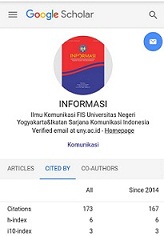DINAMIKA LSM DI INDONESIA DAN KONTRIBUSINYA TERHADAP PERKEMBANGAN DEMOKRASI
DOI:
https://doi.org/10.21831/informasi.v1i1.6752Abstract
Orientasi awal LSM atau NGO adalah ikut mengembangkon-kesejahte
raan, pembangunan dan kemudian berkembang kearah empowerment yang
bersifat politis (demokrasi partisipatoris). Oleh karena itu kemudian dikenal
3 paradigma LSM yaitu korformisme, reformasi dan. transformasi.
LSM yang aktivitasnya berkontribusi besar terhadap perkembangan
demokrasi (LSM transfonnasi) jumlahnya relatif kecil. Sehingga LSM sering
dikecam ikut andil dalam proses marginalisasi masyarakat.
Koniribusi LSM terhadap perkembangan demokrasi, antara lain sangat
tergantung pada upaya LSM untuk iilelakukan konsolidasi, rekonsiliasi,
kerjasama dengan kelompok-kelompok grass-root, dialog dengan pemerintak
untuk melahirkan saling pengertian. Disamping itu lembaga-lembaga politik
yang ada (seperti parpol, DPR) perlu ditingkatkan fungsinya agar pember
dayaan masy arakat tidak hanya akan menjadi kumpulan masy arakat yang .
selalu protes terhadap lembaga-lembaga politik, sementara itu lembaga
lembaga politik hanya sebagai proforma demokrasi belaka.
raan, pembangunan dan kemudian berkembang kearah empowerment yang
bersifat politis (demokrasi partisipatoris). Oleh karena itu kemudian dikenal
3 paradigma LSM yaitu korformisme, reformasi dan. transformasi.
LSM yang aktivitasnya berkontribusi besar terhadap perkembangan
demokrasi (LSM transfonnasi) jumlahnya relatif kecil. Sehingga LSM sering
dikecam ikut andil dalam proses marginalisasi masyarakat.
Koniribusi LSM terhadap perkembangan demokrasi, antara lain sangat
tergantung pada upaya LSM untuk iilelakukan konsolidasi, rekonsiliasi,
kerjasama dengan kelompok-kelompok grass-root, dialog dengan pemerintak
untuk melahirkan saling pengertian. Disamping itu lembaga-lembaga politik
yang ada (seperti parpol, DPR) perlu ditingkatkan fungsinya agar pember
dayaan masy arakat tidak hanya akan menjadi kumpulan masy arakat yang .
selalu protes terhadap lembaga-lembaga politik, sementara itu lembaga
lembaga politik hanya sebagai proforma demokrasi belaka.
Downloads
How to Cite
cholisin, C. (2015). DINAMIKA LSM DI INDONESIA DAN KONTRIBUSINYA TERHADAP PERKEMBANGAN DEMOKRASI. Informasi, 26(1). https://doi.org/10.21831/informasi.v1i1.6752
Issue
Section
Articles
Citation Check
License
Authors who publish with this journal agree to the following terms:
- Authors retain copyright and grant the journal right of first publication with the work simultaneously licensed under a Creative Commons Attribution License that allows others to share the work with an acknowledgement of the work's authorship and initial publication in this journal.
- Authors are able to enter into separate, additional contractual arrangements for the non-exclusive distribution of the journal's published version of the work (e.g., post it to an institutional repository or publish it in a book), with an acknowledgement of its initial publication in this journal.
- Authors are permitted and encouraged to post their work online (e.g., in institutional repositories or on their website) prior to and during the submission process, as it can lead to productive exchanges, as well as earlier and greater citation of published work (See The Effect of Open Access).












